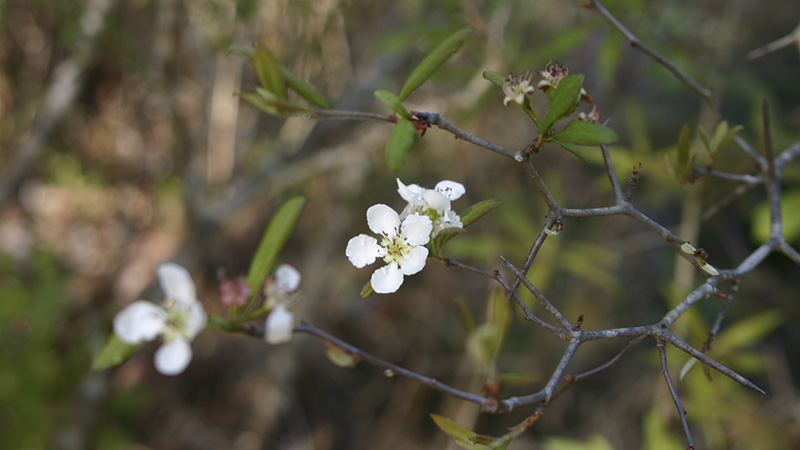The mayhaws are blooming
Published 7:00 am Wednesday, February 13, 2019

- BRIGHTLY COLORED: The blooms of the mayhaw bush look similar to the flowers of blackberries, another member of the rose family. Submitted photo
By Patricia R. Drackett, Director and Assistant Extension Professor of Landscape Architecture
The Crosby Arboretum, Mississippi State University Extension Service
Have you noticed a flash of white flowers lately in the local swamp forests? On my travels to Slidell last week, I saw the blooms of mayhaw trees (Crataegus opaca) in low-lying areas. At the Arboretum, this tree is also gearing up for a show in the moist wooded buffer between our service road and the interstate.
Mayhaw (Crataegus opaca) is a small deciduous tree native to the southeast states that matures at around twenty to thirty feet. The tree is in the Rosaceae, or rose family, and its flowers have five petals like other members of this family, which includes strawberries, blackberries, raspberries, apples, pears, cherries, and of course – roses.
In the wild, mayhaws are found growing in low, wet, slightly acidic areas such as in swamps, along creeks and in river bottoms, in association with species such as titi, swamp red maple, and tupelo gum. However, they will do just fine in your yard if planted on sites having better drainage.
In addition to being an attractive ornamental for the home landscape, mayhaws are a great choice for a wildlife garden. The fruit offers tasty food for birds and other animals, while the thorny limbs provide nesting birds with protection from predators.
After the showy flowers, red fruit appears in April or May, the time for some to gather the ripe red fruit and cook up a batch of mayhaw jelly. The fruit looks much like a cranberry and tastes similar to a crabapple. Many cultivars are available in the nursery trade that yield higher quantities of fruit than trees found in the wild.
Visitors to the Arboretum have told us a about fond memories of gathering mayhaw fruits with family members, traveling up area streams to shake the fruit from trees overhanging the banks into their canoes and then feasting later that day on homemade jelly.
Mayhaws are found growing at the Arboretum, for example, in our Slough Exhibit near the Visitors’ Center. Here, an interpretative sign describes mayhaw fruit being gathered in the swamps. The sign also gives the recipe for “Dixie McDonald’s Famous Mayhaw Jelly”.
According to the sign, “You will need one box of fruit pectin, one gallon of mayhaw fruits (this will make 4 cups of juice), and 5 ½ cups of sugar. Put the washed mayhaws into a pot and cover with water. Cook until soft, and mash the fruits. Strain the juice with cheesecloth. Add pectin to the juice. Bring to a boil for one minute. Add sugar and boil for one minute. Allow to cool and spread on biscuits. Eat until you can’t eat no more.”
Mayhaws are one of the popular trees requested at our native plant sales, and if we can locate them, we will have them in stock. Our spring sale is scheduled for March 15 and 16 (Friday and Saturday) this year.
Attend a MSU Extension Smart Landscapes Program, “Biodiverse Landscapes for Wildlife on Friday, February 15, from 10 to 11:00 a.m. Learn the requirements and resources for designing landscapes attractive to Mississippi wildlife with Pearl River County Extension Agent Dr. Eddie Smith, who will discuss how to use native plants to create sustainable habitat for animals in addition to their other benefits such as protecting water quality, lowering maintenance needs, and increasing property value. Cost for members is $3, and $5 for non-members.
A Children’s Sign Language Workshop will be held on Saturday, February 16, led by Kim Johnson. You may choose to attend at either 10:00 to 11:00 a.m. or 2:00 to 3:00 p.m. Children will learn basic ASL signs to communicate with others and some basics of sign language such as “What is your name?” “My name is…” “Want to play?” “Do you need help?” and more. Each child will receive handouts to help them remember what they have just learned. Refreshments and snacks served. $2 per member child; non-member $4. Must be accompanied by parent/guardian (no charge for adults).
Prepare for spring gardening with a program on “Maintaining Home Landscapes” on Saturday, February 23, from 10:00 to 11:00 a.m. with Pearl River County Extension Agent Dr. Eddie Smith. Cost for non-members is $5 and $3 for members. A native plant field walk will be held on the same day, from 1:00 to 2:00 p.m., led by Arboretum director Pat Drackett. Members free; non-members $5.
Please call 601-799-2311 to sign up for programs. See www.crosbyarboretum.msstate.edu or visit the Crosby Arboretum Facebook page for more information on programs and activities. We are open Wednesday through Sunday from 9 to 4. Leashed pets are welcome. The Arboretum is located at 370 Ridge Road in Picayune, at I-59 Exit 4.



